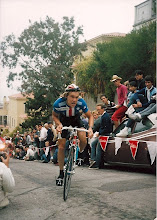Today was an epic battle for day 14 of La Vuelta a Espana; it was the third day of mountain top finishes in a row - on paper, arguably the hardest three days of racing in a Grand Tour this year. When the overall contenders hit the 12% - 14% slopes of the Sierra de la Pandera climb to the finish, it was the 23 year old Dutchman, Robert Gesink who put in surge at the front after Ivan Basso (Italy) had gone to the front to stretch some legs. Gesink, who came into the day in second place overall and only 27" behind Alejandro Valverde, timed his surge perfectly as Valverde was already in trouble from the effort Ivan Basso had made. Valverde came unhitched from the Gesink led group, and it looked like Valverde would likely loose his jersey. But, Valverde didn't panic - which likely would have caused him to ride until he blew up; instead, he stayed within himself over those few kilometers which were the steepest part of the climb, and later proceeded to reel in first Ivan Basso and Cadel Evans (Australia), and later the man who was the source of his alarm (and pain!) - Robert Gesink. By the finish Valverde had even shed Gesink and picked up another 4", which makes Valverde look more and more like a man who cannot be broken in this three-week test. Here's Valverde before everything started to unravel:

Oh, did I mention that it was also raining? Well, it was.
The winner today came from an early group of escapees, which made it to the final two climbs with a healthy advantage of over 7' on the pack. Damiano Cunego emerged from that group of nine men, to take his second victory of this year's Vuelta - and they have both come in mountain top finishes - his first being back in stage eight on the Alto de Aitana. Here's Cunego getting close to the summit, surrounded by throngs of enthusiastic fans:
 By the time Cunego made it to the finish, he still had over 2' advantage over his nearest chaser:
By the time Cunego made it to the finish, he still had over 2' advantage over his nearest chaser:
Had it not been for the very untimely puncture on the Sierra Nevada climb yesterday, in stage 13, Cadel Evans (Australia) might have been able to challenge Valverde for the overall - because he can out time trial Valverde on the penultimate day on stage 20. But, for Evans, no support cars were within sight when he punctured on the Sierra Nevada because all the team cars were stuck behind the exploding peloton on the narrow roads. Evans lost almost a minute while the neutral support fiddled with putting a new rear wheel on his bike (possibly the slowest wheel change I've ever seen!), and finally his team car arrived with his spare bike. He chased hard, initially making up ground, but eventually cracked from the effort and lost just over a minute to Alejandro Valverde. That has pretty much taken the wind out of his sails for any chances of an overall victory.
There are still seven more days of racing in this Spanish Grand Tour, and though there are lots of mountains looming on the horizon, there are no actual mountain top finishes remaining. Valverde is a better time trialist than his nearest challenger (Gesink) and pretty similar to Samuel Sanchez (Olympic Gold Medalst - Beijing) who sits in third at 1'10". At this point, La Vuelta looks to be Valverde's to loose.
Only after the next seven days will anyone know for certain, but it looks more and more like Alejandro Valverde will finally take his first ever overall Grand Tour Victory on September 20th in Madrid, Spain.
You can check out the daily action on Universal Sports TV:
and on the web (which has finally started archiving our TV broadcasts) at:
